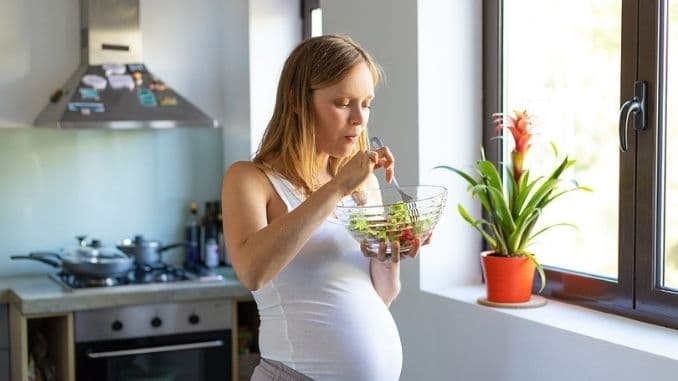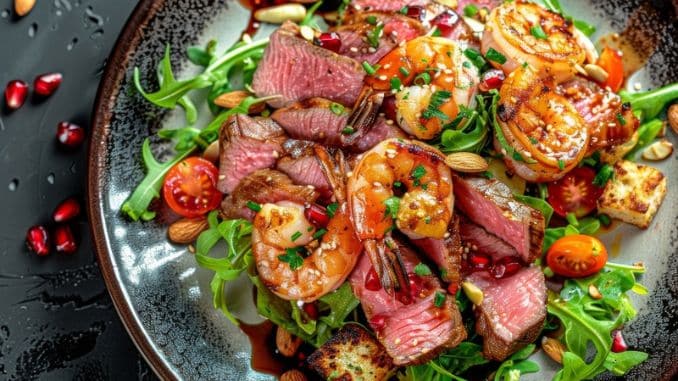Disclaimer: The information in this guide is for educational purposes only and does not replace medical advice. Always consult your doctor if you have questions about foods to avoid while pregnant. The tips provided here are general and may not apply to everyone. For advice specific to you and your baby, be sure to talk to your doctor.
When my friend was pregnant with her first baby, I remember how cautious she became about the foods to avoid while pregnant. Whenever we went out for lunch, she would always ask the waiter about the ingredients or thoroughly check the menu.
It surprised me how some foods and drinks, like her favorite key lime pie or kombucha, could suddenly be risky.
From her experience, I learned a lot. So today, I’ll share 11 foods and 9 drinks that are best to stay away from to keep you and your baby safe and healthy.
11 Foods to Avoid While Pregnant
1. Rare or undercooked meat or raw fish.
Listeria is a harmful bacteria that is present in many raw foods. It acts as a parasite in the body. According to a 2017 study[¹], pregnant women are 18 times as likely to contract a listeria infection than women who aren’t pregnant. This can lead to miscarriage, infection of the baby, or premature delivery.
Undercooked meat can also contain salmonella, which is dangerous during pregnancy.
Toxoplasmosis, a disease caused by a parasite found in undercooked meat, can also lead to complications like blindness or mental deficiencies in the baby.
2. Ice cream and other high-sugar foods.
A half-cup serving of low-sugar, organic ice cream once in a while won’t hurt a healthy mom or her developing baby. However, a cereal bowl with three scoops of mint chocolate fudge swirls each night can be detrimental to the health of mom and baby.
A 2018 study[²] was published in the American Journal of Preventive Medicine that followed over one thousand mother-child pairs from pre-pregnancy to early childhood.
The study found that women consuming 50 grams of refined sugar daily had children with lower cognitive scores than those with lower sugar intake. However, similar amounts of carbohydrates from whole fruits did not affect children cognitively.
Satisfy your ice cream cravings with our recipe for mint chocolate chip ice cream made from frozen bananas. You’ll find some other delicious low-sugar dessert ideas there too.
Dr. Josh Axe, [³] a doctor of chiropractic, certified doctor of natural medicine and clinical nutritionist, emphasizes the importance of avoiding sugary foods during pregnancy, as they can harm both the mother and baby. He suggests focusing on whole, natural foods like fresh vegetables and organic meats, while being mindful of foods to avoid while pregnant, such as junk food and sugary drinks.

3. High mercury fish.
High-mercury fish can disrupt the development of your growing baby’s nervous system. Avoid Spanish mackerel, bluefish tuna, swordfish, tilefish, and shark meat while you’re expecting.
You may also want to avoid lobster, haddock, and most canned tuna, as they contain moderate amounts of mercury.
If you enjoy fish, stick to salmon, cod, or Atlantic mackerel, all of which are low-mercury choices. Be sure the fish is caught in safe, well-tested waters rather than local streams or lakes that may have been polluted.
Alternatively, a high-quality purified fish oil supplement | 404 is a great idea if you want to play it safe and give up fish entirely for nine months.
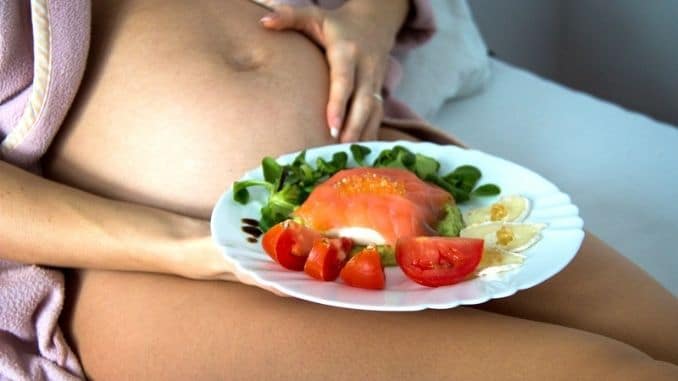
4. Pâté
Pâté made from meat liver contains high levels of vitamin A, which can be harmful in large amounts during pregnancy. Refrigerated meat spreads also pose a listeria risk.
On the other hand, Dr. Catherine Shanahan, MD, [⁴] emphasizes the importance of traditional foods like bone broth, yogurt, and healthy fats in her book Deep Nutrition: Why Your Genes Need Traditional Food.
The book emphasizes how traditional diets can positively influence fertility, pregnancy, and the development of healthy children, offering a safer and more beneficial alternative to options like pâté.
5. Deli meats served cold
Deli meats are also more likely than other foods to be contaminated with listeria.
Since pregnant women are 20 percent more likely to contract a listeria infection than the rest of the population, it’s best to avoid deli meats entirely during pregnancy. Many deli types of meat also contain nitrates and nitrites, which have been linked to cancer.

6. Unpasteurized cheeses.
In 2013 [⁵], the Las Vegas Review-Journal published a story about Vanessa White, a 25-year-old expectant mother who contracted a form of tuberculosis from eating imported, unpasteurized cheese. Her twin babies were born prematurely and died shortly after birth. The mother died as well, simply from eating unpasteurized cheese during pregnancy.
Unpasteurized cheeses can contain bacteria that cause tuberculosis, as in White’s case. They can also contain listeria, which is especially dangerous for pregnant women and their developing babies.
7. Smoked fish served cold.
Cold-smoked salmon and other smoked fish can contain harmful bacteria or even tapeworms. Avoid them during pregnancy or ensure they are cooked before consumption.
Smoked salmon is also, unfortunately, on the bad list while you’re pregnant. It could be contaminated with listeria and in some cases, tapeworms!
8. Key lime pie, certain mousses, and other desserts and foods made with raw eggs.
Desserts like key lime pie can be tricky during pregnancy. Traditional key lime pie recipes often use raw egg yolks, which can contain Salmonella.
If you’re craving this tart and tangy dessert, make sure the pie is baked, or use a recipe that incorporates pasteurized eggs or alternatives like whipped cream on top of a fully cooked pie.
Lots of desserts contain raw eggs, which can carry salmonella, a bacteria that can be fatal to pregnant women and their unborn babies.
Also, homemade mayonnaise and Caesar salad dressing contain raw eggs. The only way to safely consume these items is if they are made with pasteurized eggs.
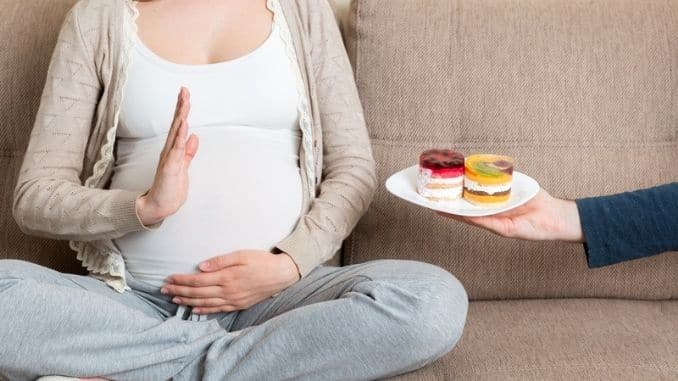
9. Raw sprouts.
Bacteria, such as E. coli, salmonella, and listeria can be carried in raw bean sprouts of any kind. Avoid them during pregnancy.
10. Unwashed produce.
Fresh fruits and vegetables are essential to a healthy pregnancy diet, but unwashed produce can contain all sorts of bacteria and germs. Wash your organic or conventionally grown produce in about a gallon of water with a splash of white vinegar before you eat it.
11. Raw unripe papaya.
Unripe or underripe papaya contains a type of latex that, when consumed in raw form, can stimulate uterine contractions in pregnant women. If you like unripe papaya, make sure you eat it cooked.
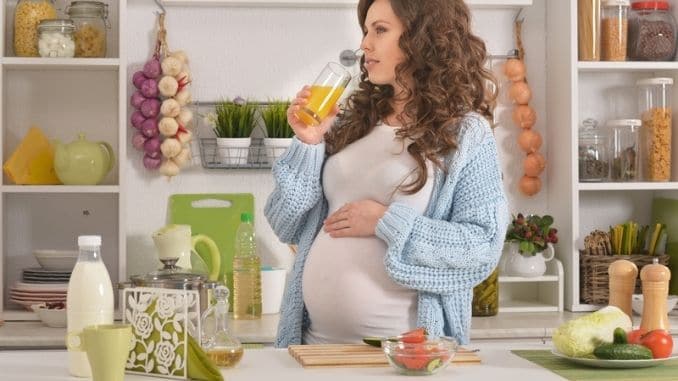
Incorporating safe and healthy foods into your diet is crucial, especially during pregnancy. Meal planning can help you avoid potential risks like unripe papaya and ensure you’re getting the nutrients you and your baby need.
Consider adding cooked papaya to your meals as part of a balanced and well-thought-out plan.
9 Drinks to Avoid During Pregnancy
Food isn’t the only thing that matters during pregnancy—it’s essential to watch your beverage intake too. Along with foods to avoid while pregnant, here are nine drinks to avoid during this time.
1. Caffeinated tea or coffee.
Some doctors [⁶] may tell you to reduce your caffeine intake to one or two cups a day during pregnancy. However, the truth is that the relationship between caffeine intake and fetal growth restriction remains unclear, and more research is needed to draw definitive conclusions, so it’s essential to consult with your healthcare provider for personalized advice.
2. Soda with sugar.
As we cited earlier, there have been studies showing a link between high sugar consumption in expectant mothers and cognitive issues in their children after birth. Similarly, the risk of preeclampsia is greater for pregnant women who drink sugar-sweetened beverages.
Dr. Claire McCarthy [⁷] advises pregnant women to avoid sugary sodas. She emphasizes that sugary and artificially sweetened beverages can lead to excessive weight gain and other health issues during pregnancy, highlighting the importance of mindful dietary choices.

3. Soda with aspartame or any other artificial sweetener.
Chris Woolston [⁸], in a piece for Health Day, highlighted concerns about consuming artificial sweeteners during pregnancy. He referenced a Japanese study that found saccharin and sucralose caused DNA damage in the digestive organs of mice.
Other studies have linked saccharin to cancer, and many animal studies have connected aspartame to cancer, though the U.S. FDA still considers aspartame safe.
Research shows that artificial sweeteners might increase the risk of early birth, making them one of the foods to avoid while pregnant. Since their safety is uncertain, it’s best for pregnant women to steer clear of them to stay safe.
4. Alcoholic beverages of any kind.
Your developing baby doesn’t need alcohol to thrive and you don’t need it to get through your pregnancy. While your great aunt Suzie might tell you that one glass of wine won’t hurt, most doctors will wisely recommend that you avoid all alcoholic beverages while you’re pregnant.
WebMD interviewed Dr. Jacques Moritz of St. Luke’s-Roosevelt Hospital in New York. Moritz said, “The problem with drinking alcohol during your pregnancy is that there is no amount that has been proven to be safe.” Many women who consume alcohol during pregnancy will have children with birth defects and fetal alcohol syndrome.
5. Wheatgrass juice.
Wheatgrass juice can promote more frequent bowel movements, which is beneficial for detoxifying and cleansing your colon under normal conditions. However, it’s one of the foods to avoid while pregnant, as it may prevent your body from absorbing all the nutrients you need, which is especially important during pregnancy.
6. Unpasteurized juice or milk.
Stick to pasteurized milk and juice during pregnancy.
There’s a chance that you may encounter listeria in unpasteurized milk and juice. While listeria may not give non-pregnant person symptoms, it can cause miscarriage for an expecting mother.

7. Unfiltered or untested water.
Some say high levels of fluoride in municipal water supplies have been linked to preeclampsia in pregnant women. Researchers at The University of Queensland found that adding fluoride to community drinking water does not harm children’s brain development.
Professor Loc Do [⁹] from the School of Dentistry said the study compared the brain development of children who drank fluoridated water when they were young with those who did not. The results showed no difference in brain function between the two groups.
“We found emotional and behavioral development, and functions such as memory and self-control, were at least equivalent to those who had no exposure to fluoridated water,” Professor Do said.
Even so, if you’re concerned about the quality of your water during pregnancy, you may want to consider purchasing a high-quality water filter to ensure you’re hydrating with fresh, clean water throughout this critical period.
8. Kombucha.
Kombucha is a fermented wonder drink. However, it contains caffeine and should not be consumed during pregnancy.
9. Unpasteurized Eggnog.
We’ve already mentioned raw eggs as one of the key foods to avoid while pregnant, so homemade eggnog made with raw eggs is definitely off-limits. However, you can still enjoy eggnog by opting for vegan or pasteurized versions, which are widely available at most grocery stores.

Final Thoughts
My friend often talked about how hard it was to give up some of her favorite foods and drinks while she was pregnant, like coffee and wine. But she knew it was important for her baby’s health. Now, she looks back and says it was worth it. The time goes by quickly, and soon you’ll be holding your little one.
Skipping a few things for a short time really helps your baby grow healthy. If you’re ever unsure about what to eat or drink, always check with your doctor. It’s all about making the best choices for your baby’s well-being.
Tired of the emotional roller coaster that each day brings? Try our 14-Day Hormone Balancing program below.

